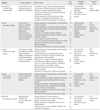Abstract
Purpose
This study was conducted to develop and implement a case-based small group learning program on the care of children with infectious disease, and to examine its effects on knowledge, attitude and preventive practice behaviors of daycare center teachers compared to a control group.
Methods
Based on the need assessment, the case-based learning program for the management of infectious children was developed. For this quasi-experimental study, 69 teachers were recruited from 14 child daycare centers in a city located in J province. Thirty four teachers were assigned to experimental group and participated in the case-based small group learning once a week for 5 weeks. Data were analyzed using the SPSS 18.0 program to perform χ2-test and t-tests. Analysis of covariance was used to treat the covariate of the number of assigned children between experimental and control groups.
Figures and Tables
 | Figure 1Development steps of the case-based small group learning for care of infected children (ADDIE model). |
Table 1
Composition and Contents of the Outline of Case-based Small Group Learning on Care of Infected Children

Table 2
Homogeneity Test of Sample Charactristics and Outcome Variables between the Experimental and Control Groups (N=69)

References
1. Benfield JP. The effect of a teaching program on infection prevention behavior in day care center staff members. 1991. Washington D. C., USA: The Catholic University;Unpublished doctoral dissertation.
2. Crowley AA, Kulikowich JM. Impact of training on child care health consultant knowledge and practice. Pediatr Nurs. 2009. 35:93–100.
3. Hagerhed-Engman L, Bornehag CG, Sundell J, Aberg N. Day-care attendance and increased risk for respiratory and allergic symptoms in preschool age. Allergy. 2006. 61:447–453. http://dx.doi.org/10.1111/J.1398-9995.2006.01031.x.
4. Faul F, Erdfelder E, Buchner A, Lang AG. Statistical power analysis using G*Power 3.1: Tests for correlation and regression analyses. Behav Res Methods. 2009. 41:1149–1160. http://dx.doi.org/10.3758/BRM.41.4.1149.
5. Fukkink RG, Tavecchio LW. Effects of video interaction guidance on early childhood teachers. Teach Teach Educ. 2010. 26:1652–1659. http://dx.doi.org/10.1016/j.tate.2010.06.016.
6. Gupta RS, Shuman S, Taveras EM, Kulldorff M, Finkelstein JA. Opportunities for health promotion education in child care. Pediatrics. 2005. 116:e499–e505. Advanced online publication. http://dx.doi.org/10.1542/peds.2005-0467.
7. Han KJ, Bang KS, Kwon MK, Kim JS, Choi MY, Huh BY. Development of visiting nurses service model in child day-care centers. J Korean Soc Matern Child Health. 2010. 14:57–73.
8. Han KJ, Kim JS, Choi MY. Needs of day-care staff for a center-based child care health program II. J Korean Acad Child Health Nurs. 2007. 13:128–135.
9. Kim HJ. The present situation of adjustment programs performed for young children in child care center. Early Child Educ Res Rev. 2010. 14:443–470.
10. Kim JS. Effects of a training program on infection prevention for staff of child daycare centers. J Korean Acad Child Health Nurs. 2007. 13:467–477.
11. Kim SJ, Yang SO, Lee SH, Lee JE, Kim SH, Kang KA. Development and evaluation of a child health care protocol for child day care center teachers. J Korean Acad Child Health Nurs. 2011. 17:74–83. http://dx.doi.org/10.4094/jkachn.2011.17.2.74.
12. Korea Childcare Promotion Institute. Standard continuing education courses. 2010. 03. Seoul: Author.
13. Kotch JB, Isbell P, Weber DJ, Nguyen V, Savage E, Gunn E, et al. Hand-washing and diapering equipment reduces disease among children in out-of-home child care centers. Pediatrics. 2007. 120:e29–e36. http://dx.doi.org/10.1542/peds.2005-0760.
14. Lee EJ. Teachers' awareness and their role performance on preschoolers' health management. 2011. Daejeon: Chungnam National University;Unpublished master' thesis.
15. Lim NY, Kim JH, Chon JJ, Jung MH, Kim BH, Yoo EK, et al. Development model of child health promotion center. Korean Nurse. 2003. 42(5):74–82.
16. Michaelsen LK, Parmelee DX, McMahon KK, Levine RE. Team-based learning for health professions education- a guide to using small groups for improving learning-. 2007. Sterling, VA: Stylus Publishing.
17. inistry of Health and Welfare. 2009 Statistics on child care programme (Issue Brief No. 11-1351000-000016-10). 2010. 05. 24. Seoul: Author.
18. Ministry of Health and Welfare. Early childhood care law. 2012. 02. 03. Retrieved March 30, 2012. from http://www.lawnb.com/lawinfo/contents_view.asp?cid=C39B5D1A899A49FC8C5D08904AD3ADF2|0|K.
19. Oh KS, Sim MK, Choi EK. Effect of an education program on child health and safety for child care teachers. J Korean Acad Child Health Nurs. 2009. 15:5–14. http://dx.doi.org/10.4094/jkachn.2009.15.1.5.
20. Park SN, Lee YR, Joung YJ, Kim KM. Knowledge and management of children with infectious disease by daycare facility teachers. J Korean Acad Public Health Nurs. 2010. 24:115–125.
21. Roberts L, Smith W, Jorm L, Patel M, Douglas RM, McGlichrist C. Effect of infection control measures on the frequency of upper respiratory infection in child care: A randomized controlled trial. Pediatrics. 2000. 105:738–742. http://dx.doi.org/10.1542/peds.105.4.738.
22. Ryu CS, Ji OJ, Yoon SY. A study on the role taking of the in-service educator to increase the self-reflection in group for kindergarten teachers. J Korea Open Assoc Early Child Educ. 2001. 6:107–124.
23. Taveras EM, Lapelle N, Gupta RS, Finkelstein JA. Planning for health promotion in low-income preschool child care settings: Focus groups of parents and child care providers. Ambul Pediatr. 2006. 6:342–346. http://dx.doi.org/10.1016/j.ambp.2006.07.004.
24. Uhari M, Mottonen M. An open randomized controlled trial of infection prevention in child day-care centers. Pediatr Infect Dis J. 1999. 18:672–677.




 PDF
PDF ePub
ePub Citation
Citation Print
Print




 XML Download
XML Download